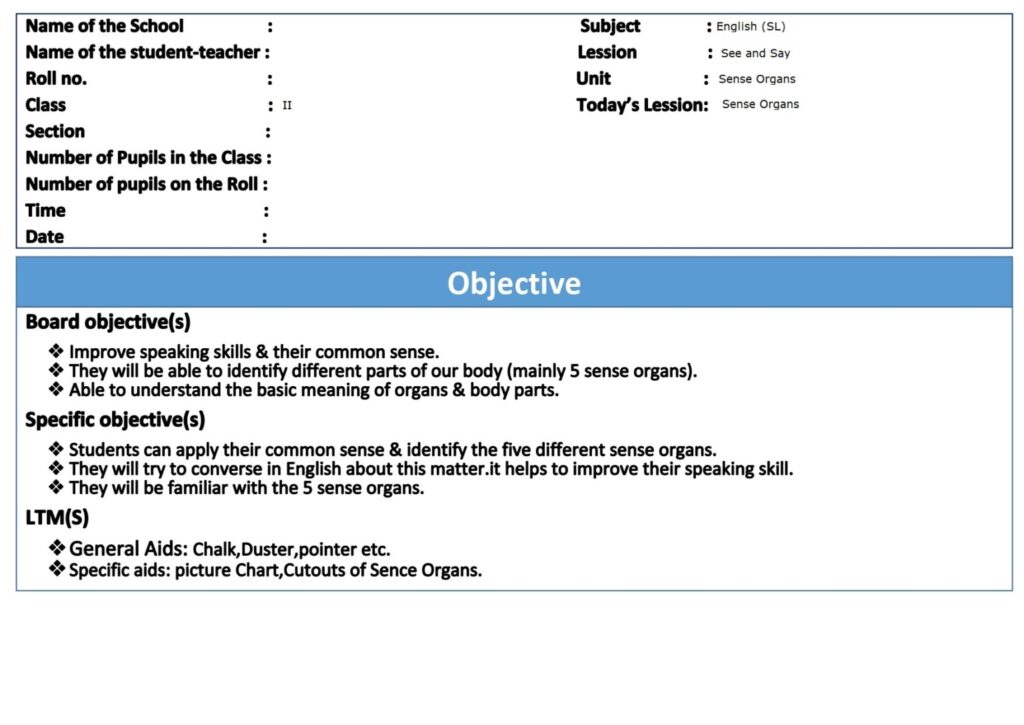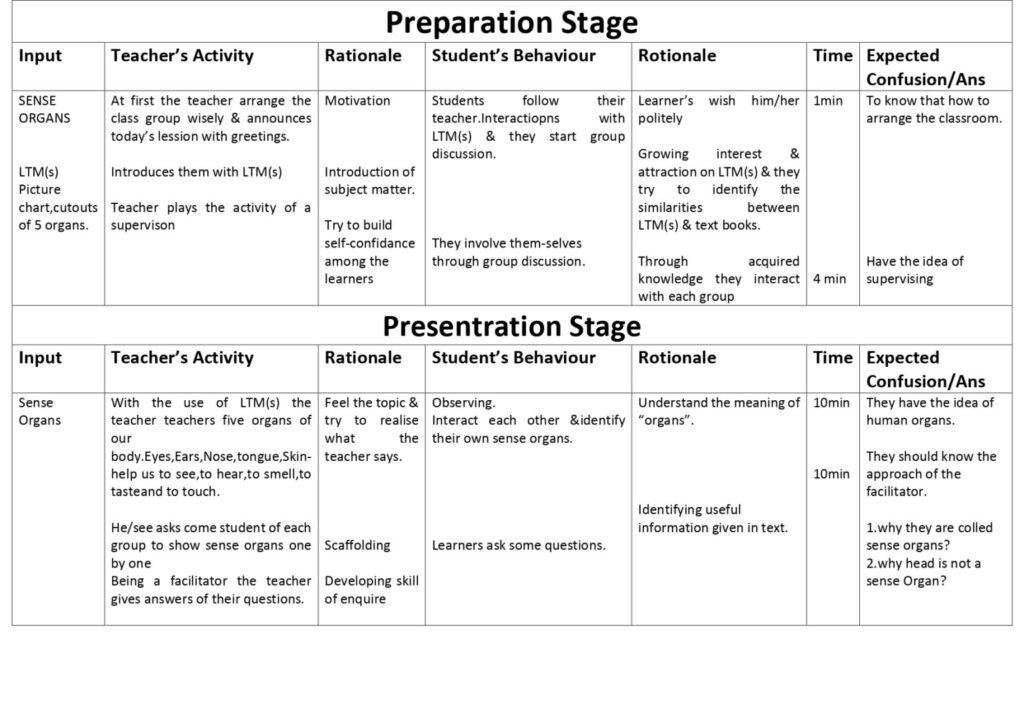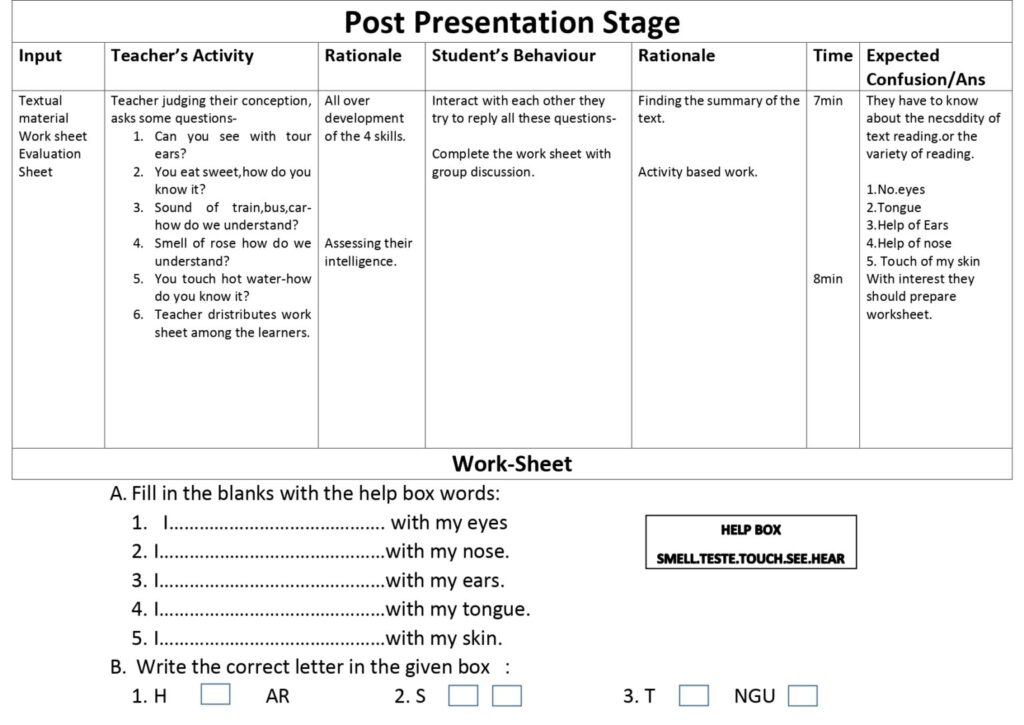এখানে Class II English Sense Organs Macro Lesson Plan শেয়ার করা হলো। / D.El.Ed Course WBBPE দ্বিতীয় শ্রেণী ইংরেজি লেসন প্ল্যান
D.El.Ed Course WBBPE
Class II English Sense Organs Macro Lesson Plan (Image)



WBBPE D.El.Ed Course
Class II English Sense Organs Macro Lesson Plan (Text)
Objective:
Board Objectives:
To improve students’ speaking skills and develop their common sense.
They will be able to identify different parts of the human body (mainly the five sense organs).
They will understand the basic meaning of organs and body parts.
Specific Objectives:
Students will apply their common sense to identify the five different sense organs.
They will try to converse in English on this topic, which will help improve their speaking skills.
They will become familiar with the five sense organs.
Teaching Aids (LTM)
General Aids: Chalk, duster, pointer, etc.
Specific Aids: Picture charts, cutouts of sense organs.
Preparation Stage
The teacher arranges the class into groups and announces the lesson with greetings.
Motivation: Students follow the teacher’s instructions, interact with the LTM(s), and begin group discussion.
Learners’ Behaviour: Students politely greet the teacher.
Time: 1 minute.
Expected Confusion/Answer: How to arrange the classroom.
Next, the teacher introduces picture charts and cutouts to the students.
Rationale: To generate interest and attraction towards the LTM(s).
Teacher’s Role: Acts as a supervisor.
Students’ Role: Participate in group discussion and build self-confidence.
Time: 4 minutes.
Expected Confusion/Answer: Understanding the idea of supervision.
Presentation Stage
Input: Sense Organs.
With the help of LTM(s), the teacher explains the five sense organs—eyes, ears, nose, tongue, and skin.
The teacher invites one student from each group to show a sense organ.
Acting as a facilitator, the teacher also answers students’ questions.
Rationale: To help students feel and realize the topic.
Scaffolding: Developing inquiry skills.
Students’ Behaviour: Students observe their own sense organs, interact with each other, and ask questions.
Rationale: To understand the meaning of “organ” and identify useful information from the text.
Time: 10 minutes.
Expected Confusion/Answer:
Why are they called sense organs?
Why is the head not a sense organ?
Post-Presentation Stage
Input: Textual material, worksheet, evaluation sheet.
The teacher checks students’ understanding by asking questions such as:
Can you see with your ears?
When you eat something sweet, how do you know it?
How do you understand the sound of a train, bus, or car?
How do you recognize the smell of a rose?
When you touch hot water, how do you know it?
Rationale: For overall development of the four skills (listening, speaking, reading, writing).
Students’ Behaviour: Students interact with each other, reply to questions, and complete the worksheet through group discussion.
Time: 7–8 minutes.
Worksheet
A. Fill in the blanks with the help box words:
I _ with my eyes.
I _ with my nose.
I _ with my ears.
I _ with my tongue.
I _ with my skin.
Help Box: SEE, SMELL, HEAR, TASTE, TOUCH
D.El.Ed Course WBBPE
Class II English Sense Organs Macro Lesson Plan (Set: 2)
Name of the School:
Name of Pupil Teacher:
Class: IV
Section: A
Subject:
Topic: Sense Organs
Date: 03/08/25
Duration: 46 minutes
General Objectives:
(1) Students will be able to identify the five sense organs.
(2) Students will use each sense organ to recognize objects around them.
(3) Develop curiosity and scientific understanding of the natural world.
Specific Objectives:
(1) Encourage positive attitudes, honesty, and respect for others.
(2) Help students recognize different stimuli through seeing, hearing, smelling, tasting, and touching.
Teaching Aids:
(1) Blackboard, Chalk, Whiteboard, Flashcards, Pictures, Textbook
Previous Knowledge:
(1) Students should have some prior knowledge about the five sense organs.
(2) Sample questions from the teacher:
(i) What are the five sense organs? → Eyes, Ears, Nose, Tongue, Skin
(ii) Which is the largest sense organ? → Skin
(iii) How do our sense organs help us? → They help us see, hear, taste, smell, and touch.
Announcement of the Topic:
“Students, today we will learn about our sense organs and how they help us in daily life.”
Presentation:
Sense Sense Organs
Eyes
The eyes help us see things like shapes, colors, animals, and people.
Student Activity: Students observe and discuss what they see around them.
Nose
The nose helps us smell. Special nerves send signals to the brain. We can smell flowers or food (good) and garbage or drains (bad).
Student Activity: Students identify different smells around them.
Ears
The ears help us hear sounds such as music, conversations, or nature sounds.
Student Activity: Students listen carefully and identify different sounds.
Tongue
The tongue helps us taste—sweet, salty, sour, and bitter. It is also the largest muscle in the body.
Student Activity: Students taste different items to recognize flavors.
Skin
The skin gives us the sense of touch—hot, cold, soft, or rough. It also protects us from danger, such as burns.
Student Activity: Students touch objects to feel temperature and texture.
Eyes
The eyes help us see things like shapes, colors, animals, and people.
Student Activity: Students observe and discuss what they see around them.
Nose
The nose helps us smell. Special nerves send signals to the brain. We can smell flowers or food (good) and garbage or drains (bad).
Student Activity: Students identify different smells around them.
Ears
The ears help us hear sounds such as music, conversations, or nature sounds.
Student Activity: Students listen carefully and identify different sounds.
Tongue
The tongue helps us taste—sweet, salty, sour, and bitter. It is also the largest muscle in the body.
Student Activity: Students taste different items to recognize flavors.
Skin
The skin gives us the sense of touch—hot, cold, soft, or rough. It also protects us from danger, such as burns.
Student Activity: Students touch objects to feel temperature and texture.
Recapitulation / Review Questions:
(1) Why are sense organs important?
(2) How can you feel if an object is hot or cold?
(3) What do you mean by good touch and bad touch?
(4) From which organ can you see a flower?
Homework:
(1) Name the five sense organs and their functions.
(2) Write the uses of each sense organ.
FAQ: Sense Organs
১. Sense organs কী?
উত্তর: Sense organs হলো আমাদের শরীরের বিশেষ অঙ্গ যা আমাদের চারপাশের জগত বোঝাতে সাহায্য করে।
২. আমাদের কয়টি sense organs আছে?
উত্তর: আমাদের ৫টি sense organs আছে – চোখ, কান, নাক, জিভ ও ত্বক।
৩. চোখের কাজ কী?
উত্তর: চোখ দিয়ে আমরা দেখি – যেমন মানুষ, ফুল, বই বা চারপাশের জিনিস।
৪. কান দিয়ে আমরা কী করি?
উত্তর: কান দিয়ে আমরা শুনতে পারি – যেমন পাখির গান, গাড়ির শব্দ।
৫. নাকের কাজ কী?
উত্তর: নাক দিয়ে আমরা গন্ধ অনুভব করি – যেমন ফুলের সুগন্ধ বা রান্নার ঘ্রাণ।
৬. জিভ কী কাজে লাগে?
উত্তর: জিভ দিয়ে আমরা স্বাদ বুঝি – যেমন মিষ্টি, নুন, টক।
৭. ত্বকের কাজ কী?
উত্তর: ত্বক দিয়ে আমরা স্পর্শ ও তাপ অনুভব করি – যেমন গরম জল, নরম কাপড়।
৮. sense organs ছাড়া কি আমরা চারপাশ বুঝতে পারি?
উত্তর: না, sense organs ছাড়া আমরা চারপাশ ঠিকভাবে বুঝতে পারি না।
৯. মাথা sense organ কি?
উত্তর: না, মাথা একটি sense organ নয়। Sense organs হলো চোখ, কান, নাক, জিভ এবং ত্বক।
১০. sense organs শেখার গুরুত্ব কী?
উত্তর: এগুলো শেখার মাধ্যমে আমরা আমাদের শরীরের কাজ বুঝি, চারপাশের জগৎ বুঝি এবং দৈনন্দিন কাজ সহজে করতে পারি।
আরও দেখো:
Facebook Group: TextbookPlus
আমাদের ইউটিউব চ্যানেল: TextbookPlus
টেলিগ্রাম গ্রুপ: GhoshClass
